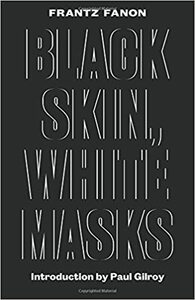Take a photo of a barcode or cover
informative
Even if this book is more than half a century old, it sounds as though it could have been written less than 10 years ago. There are plenty of things here that I do not understand and someone could spend a lifetime trying to untangle exactly what Fanon is saying. He makes an excellent case for the difficulty of being a black person in a white construction of the world. Even if one does not have a direct affective relationship with his experiences or those of his patients, his writing is charged enough and sensual enough (in ways that made this problematic as an "objective" academic dissertation) to make the points at least emotionally clear. Fanon is mad and with reason. A large part of this project is to explain how when the black person is treated as if they don't exist, they are not allowed to have an ontology; they are not allowed to create theory; use method; have "good" change in the world, and then explain how to approach this.
The only problems I could see immediately with this text is, first and foremost, Fanon tends to come across as a little misogynistic when he writes of women. And when he isn't writing of women, he focuses primarily on the dilemmas of men. Secondly, having a basic to intermediate grasp of Hegel, Foucault, and Freud goes a long way to understanding this book. Fanon is playing a lot with their ideas if only to show how many of their thoughts fail to explain the black person's dilemma in Europe and the U.S.
Despite the intentional show of the failures of western philosophy and psychology, the failure of much of the current (white) readership having limited access to the experiences of which Fanon is pulling from, Fanon is resonant and affectively powerful in his writing.
The only problems I could see immediately with this text is, first and foremost, Fanon tends to come across as a little misogynistic when he writes of women. And when he isn't writing of women, he focuses primarily on the dilemmas of men. Secondly, having a basic to intermediate grasp of Hegel, Foucault, and Freud goes a long way to understanding this book. Fanon is playing a lot with their ideas if only to show how many of their thoughts fail to explain the black person's dilemma in Europe and the U.S.
Despite the intentional show of the failures of western philosophy and psychology, the failure of much of the current (white) readership having limited access to the experiences of which Fanon is pulling from, Fanon is resonant and affectively powerful in his writing.
This book was really interesting and it def was/is important for the founding of post colonial theories and now I def want to know if there is more work that tries to explain the way racism works in a psychological way because I think it's a topic not so many people write books about. STILL I couldn't bare the homophobic comments he sometimes made and I also didn't like that he was treating the black man's experience as THE black experience.
3,5 stars
3,5 stars
Very very interesting read. A must-read for everyone, who is interested in post-colonial studies. Nevertheless, I felt this non-fiction book is shockingly relevant today, although it was first published in 1952 in english translation.
ze bude fanon incelskej misogyn jsem necekal ale jinak banger (mirna nadsazka)
Some parts lost me, possibly partly due to the translation I read. This is often misogynist and the chapter on Psychopathology I would skip on reread, but the rest is incendiary.
While much of the Black Skin, White Masks is given over to psychoanalysis and debates within that field, the book shines for its Nietzschean passages which combine evocative prose with radical philosophy. These passages capture something furious, boundless, and phoenix-like in Fanon's vision of man's future. These captivating passages deserve 5 stars, but the overbearing weight of the psychoanalysis and increasingly meaningless psychic distinctions and debates drag down the overall rating.
As Kwame Anthony Appiah duly notes in the foreword:
A chapter-by-chapter summary
The introduction and Chapter one blaze forth with Fanon's lyrical power.
Chapter two and three are primarily literary criticism from a psychoanalytic perspective—first focusing on the black woman desiring a white man, then the black man desiring a white woman. In both cases, the desire and reciprocation from the white person grants the black person a psychological payoff that comes as a result of in some way accepting the racist social structure they have been born into. Fanon hints throughout at the possibility of rejecting this skewed value system in favor of new standards.
Chapter four presents a unique psychoanalytic attack on Olivade Mannoni, a student of Lacan, and most famous for his work The Psychology of Colonization. But still, the focus is of psychoanalytical and historical importance more than anything.
Chapter five sees the return of Fanon's energized prose and affective struggle.
Chapter six descends again into archaic minutiae—psychopathology of the black man—and is the longest chapter.
Chapter seven extends the minutiae for a few pages with a focus on Adler's account of the Other and Hegel's implications for black consciousness.
Finally, chapter eight concludes with that sweet-fire voice, imploring the reader to escape the weight of history and focus on present and future conditions so as to avoid the false dichotomy between white and black and all its attendant false premises of inferiority and superiority.
A difficult question
How would Fanon respond to contemporary racial politics? There's a widespread attachment to blackness as either the category for equality (e.g. civil rights and the 14th amendment) or special treatment (e.g. affirmative action, #blackisbeautiful, radical theories of black nationalists and feminists, etc.). Both of these stances enmesh blackness (and therefore racial categories as such) in formal institutions and policy as well as informal language and norms. These political developments have increased the weight of racial history rather than dropping it as Fanon has prescribed. Therefore, to truly take Fanon at his word and break with the contemporary world's focus on blackness would be perhaps more radical than a break with Fanon's own blatantly racist world.
As Kwame Anthony Appiah duly notes in the foreword:
We may no longer find the psychoanalytic framework as useful in understanding racism's causes and effects as [Fanon] did. But the vigor of his evocations of the psychological damage wrought on many colonial peoples—and on the colonizers who oppressed them—remains... his work remains a powerful reminder of the psychological burdens that colonial racism imposed upon its victims. (ix)
A chapter-by-chapter summary
The introduction and Chapter one blaze forth with Fanon's lyrical power.
Chapter two and three are primarily literary criticism from a psychoanalytic perspective—first focusing on the black woman desiring a white man, then the black man desiring a white woman. In both cases, the desire and reciprocation from the white person grants the black person a psychological payoff that comes as a result of in some way accepting the racist social structure they have been born into. Fanon hints throughout at the possibility of rejecting this skewed value system in favor of new standards.
Chapter four presents a unique psychoanalytic attack on Olivade Mannoni, a student of Lacan, and most famous for his work The Psychology of Colonization. But still, the focus is of psychoanalytical and historical importance more than anything.
Chapter five sees the return of Fanon's energized prose and affective struggle.
Chapter six descends again into archaic minutiae—psychopathology of the black man—and is the longest chapter.
Chapter seven extends the minutiae for a few pages with a focus on Adler's account of the Other and Hegel's implications for black consciousness.
Finally, chapter eight concludes with that sweet-fire voice, imploring the reader to escape the weight of history and focus on present and future conditions so as to avoid the false dichotomy between white and black and all its attendant false premises of inferiority and superiority.
A difficult question
How would Fanon respond to contemporary racial politics? There's a widespread attachment to blackness as either the category for equality (e.g. civil rights and the 14th amendment) or special treatment (e.g. affirmative action, #blackisbeautiful, radical theories of black nationalists and feminists, etc.). Both of these stances enmesh blackness (and therefore racial categories as such) in formal institutions and policy as well as informal language and norms. These political developments have increased the weight of racial history rather than dropping it as Fanon has prescribed. Therefore, to truly take Fanon at his word and break with the contemporary world's focus on blackness would be perhaps more radical than a break with Fanon's own blatantly racist world.
challenging
informative
reflective
medium-paced
3.5 stars. Had me in the beginning, lost me in the middle, had me at the end again. So many damn quote-worthy passages in this text. I can see why it is considered seminal and one of the pillars of modernist Black literature. But this doesn’t excuse Fanon from being a dense writer who rambles and loses his readers in the depths of philosophical theory. I feel like I need to read the book again or watch a video essay to fully understand it. I often see readers give Artists of Colour rave reviews despite fundamental flaws in their art. It undermines the point of criticism completely. Fanon’s work, no matter how profound in its message, seems to be a text that fits this category.

